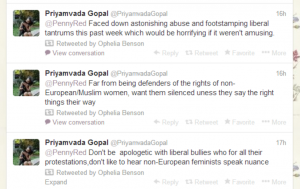More from Mayer’s long 2000 article on gender apartheid. The article is very apposite to what we’ve been talking about lately.
The discussion will point out how those seeking to defend what amounts to gender apartheid have tried to turn the discussion away from actual patterns of oppression of women, endeavoring to depoliticize this phenomenon by, among other things, minimizing the important role of the state. Instead of acknowledging that governments of modern states are controlled by men and that these men may have vested interests in retaining a status quo that favors them, they pretend that religion and culture are independent determinants of women’s status. [Read more…]

